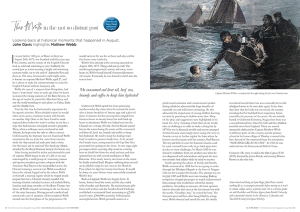Looking back at historical moments that happened in August, John Davis highlights Mathew Webb

It is just before 1.00 p.m. at Dover in Kent on August 24th, 1875, one hundred and fifty years ago this month, and the waters of the English Channel look as cold and uninviting as ever. Suddenly the crowd part as a man wearing a bright red swimming costume walks out to the end of Admiralty Pier and dives in. The man, festooned in such bright attire, is former sea captain Matthew Webb, aged 27, and he is about to make his second attempt to swim the English Channel without buoyancy aids.
Webb, the son of a surgeon from Shropshire, had been a ‘water baby’ since an early age when he learnt to master the strong currents of the River Severn. At the age of twelve he joined the Merchant Navy and saw the world travelling to such places as China, India and the Middle East.
Even by this time he had earned a reputation for his aquatic activities. When docked in port he would often swim across a harbour to dine with friends on another ship. Once in the Suez Canal he made repeated dives below the water’s surface to cut free a rope that had become entangled around a propeller. Then, when a colleague went overboard in mid-Atlantic, he leapt over the side to affect a rescue. Unfortunately, his shipmate was not found and Webb remained in the icy water for some forty minutes while the ship turned tail and came back to him. For this brave act he received The Stanhope Medal, awarded by the Royal Humane Society for heroic acts.
After having worked his ticket and attained the rank of captain, Webb began to tire of a life at sea and encouraged by a small group of swimming trainers and sports journalists got into a dispute with the American Paul Bayton who had paddled across the Channel wearing a survival suit. Webb considered him to be a fraud. Egged on by the others, Webb set himself a training regime which he hoped would prepare him for a Channel attempt unaided. His training schedule included sessions at Lambeth Baths, London and along stretches of the River Thames but above all Webb enjoyed swimming in the sea because of the extra buoyancy. Having passed a medical and armed with a jar of porpoise oil for insulation Webb moved into the final phase of his preparations. He would swim in the sea for an hour each day and for five hours every tenth day.
Webb’s first attempt at the crossing occurred on August 12th, 1875. Things did not go well. The weather got progressively stormy and soon, seven hours in, Webb found himself fourteen kilometres off course. Eventually he was forced to climb into the rescue boat.
Undeterred, Webb opted for more promising weather twelve days later when he entered the water after a hearty breakfast of bacon, eggs and a glass of claret. Estimates for the crossing time ranged from fourteen hours to twenty hours but with back-up boats in attendance Webb was helped out into the Channel on a strong ebb tide. Several friends joined him in the water during the swim and he consumed cod liver oil, beef tea, brandy and coffee to keep him hydrated. He tried to keep his feeding stops brief in order to preserve body heat. As he neared the French coast, strong currents off Cap Gris-Nez prevented him getting to the shore. At one stage eight passengers from a passing ship stood in a rowing boat to shield him from the wind and rain and then spurred him on with several renditions of Rule Britannia. After nearly twenty-two hours in the water, he finally touched land. Despite suffering from several nasty jellyfish stings he was soon in the Hotel de Paris where he slept for twenty-four hours. It would be thirty-six years before some successfully emulated Webb’s feat.
Back in England, Webb was hugely feted. At home, flowers lined the route and the day ended with a bonfire and fireworks. He received many gifts from well-wishers and the London Stock Exchange established a testimonial fund amounting to £2,500 (worth some £300,000 currently). Following his accomplishments, Webb pursued a career as a professional swimmer and a motivational speaker during which he advocated the huge benefits of especially sea and wild water swimming. He also advocated the importance of young children learning to swim by practising in shallow water first. Many of his ideas and suggestions were highlighted in his book The Art of Swimming. From then on, he would take on challenges in order to make a living but by 1879 he was in financial trouble and events arranged for him became increasingly more taxing. He went to America to try to further exploit his fame where he became involved again with his nemesis, Paul Bayton. The trip did little to ease the financial situation and he soon returned home only to go back again later to take on more challenges. In March 1883 he was forced to withdraw from yet another race when he was diagnosed with tuberculosis and spent the next two months bed-ridden while he tried to recover.
Totally ignoring the advice of family and friends, Webb announced in 1882 that he was going to swim through the Whirlpool Rapids at the foot of Niagara Falls on the Canada-USA border. The attempt was set for July 1883 and Webb went into training. Railway companies charged passengers to watch and promised him earnings that would have solved his money problems.
According to accounts, the boat operator tried to dissuade him even at the last minute but with the words, “Goodbye, boy,” he exited the boat. The first part went well but, after being lifted by a huge wave, Webb shouted and raised his arm. He briefly resurfaced several times but was eventually lost in the whirlpool never to be seen alive again. It was four days later that his body was recovered, the autopsy revealing that he had died from respiratory failure caused by the pressure of the water. He was initially buried in Oakwood Cemetery, Niagara but there was a second funeral later when his wife and two children travelled over from England. There are several memorials dedicated to Captain Matthew Webb in different parts of the country and the primary school in his home village of Dawley is named after him. Several of the memorials bear the inscription: “NOTHING GREAT IS EASY”. In 1965 he was inducted into the International Hall of Fame.
Footnote: His story is told in the film Captain Webb (2015) directed by Justin Hardy and starring Warren Brown in the title role.
Semi-retired and living in Lyme Regis, John Davis started working life as a newspaper journalist before moving on to teach in schools, colleges and as a private tutor. He is a history graduate with Bachelors and Masters degrees from Bristol University with a particular interest in the History of Education and Twentieth Century European History.



